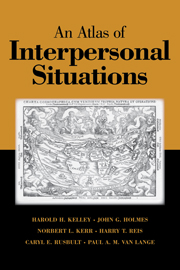Book contents
- Frontmatter
- Contents
- Preface
- PART ONE INTRODUCTION AND THEORY
- PART TWO THE SITUATIONS
- Single-Component Patterns
- Two- and Three-Component Patterns
- Entry #5 The Prisoner's Dilemma: Me versus We
- Entry #6 Threat: Trading Loyalty for Justice
- Entry #7 Chicken: Death before Dishonor
- Entry #8 Hero: Let's Do It Your Way
- Entry #9 Conjunctive Problems: Together We Can Do It
- Entry #10 Disjunctive Problems: Either of Us Can Do It
- Entry #11 Asymmetric Dependence: You're the Boss
- Time-Extended Patterns
- Incomplete Information Situations
- N-Person Situations
- Movement from One Situation to Another
- PART THREE EPILOGUE
- References
- Author Index
- Subject Index
Entry #7 - Chicken: Death before Dishonor
Published online by Cambridge University Press: 21 October 2009
- Frontmatter
- Contents
- Preface
- PART ONE INTRODUCTION AND THEORY
- PART TWO THE SITUATIONS
- Single-Component Patterns
- Two- and Three-Component Patterns
- Entry #5 The Prisoner's Dilemma: Me versus We
- Entry #6 Threat: Trading Loyalty for Justice
- Entry #7 Chicken: Death before Dishonor
- Entry #8 Hero: Let's Do It Your Way
- Entry #9 Conjunctive Problems: Together We Can Do It
- Entry #10 Disjunctive Problems: Either of Us Can Do It
- Entry #11 Asymmetric Dependence: You're the Boss
- Time-Extended Patterns
- Incomplete Information Situations
- N-Person Situations
- Movement from One Situation to Another
- PART THREE EPILOGUE
- References
- Author Index
- Subject Index
Summary
Examples
The name of this situation is based on a deadly game. In one version, the two contestants – invariably males – drive their cars at high speed, headlong toward each other. The essence of this high-stakes game is to see which contestant has the stronger nerves. The first one to veer off course to avoid a collision loses the test of courage and is branded a “chicken” (i.e., a coward). If both drivers (in a simultaneous moment of sanity) veer off, the contest ends in a draw – somewhat embarrassing but giving neither a justification for accusing the other of less courage. Of course, if neither driver “chickens out,” the result is a fatal – and hence, rather hollow – “victory” for both. Another variation on this game – in which the contestants simultaneously drive toward a cliff's edge – was depicted in the film Rebel without a Cause.
A similar situation occurs when neighboring countries, seeking something valuable possessed by the other, issue ultimatums threatening war if the other will not yield. If one's neighbor yields, one may gain something of real value, but if neither yields and both carry through on their threats, the resulting war is likely to cost both far more than what was sought through the initial threats.
Struggles for dominance in a group can also create a Chicken situation.
- Type
- Chapter
- Information
- An Atlas of Interpersonal Situations , pp. 203 - 215Publisher: Cambridge University PressPrint publication year: 2003



